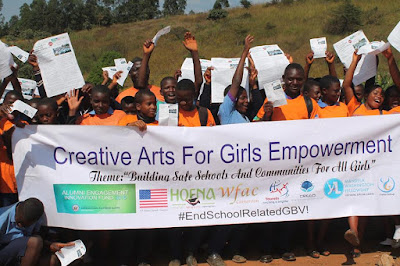Bamenda,
Cameroon—At least 1000 people participated in the launch, hursday
December 10, 2015 of a project to curb gender-based violence in schools dubbed
“Creative Arts for Girls Empowerment” at the Bamenda congress hall.
 |
| Cross-section of students at the 'creative arts' project launch |
Supported by the US Embassy in Yaounde, the project uses
dramas, songs and debates to fight school-related gender-based violence and
empower the young girls.
“Through this project, we are working with students,
teachers, parents and community members to respond to and prevent gender based
violence in and around schools–building a safe environment for all, especially
girls to learn,” Christelle Bay, director of a local nongovernmental
organization, Hope For the Needy Association (HOFNA) Cameroon that is
championing the project said.
Besides debates by students from some schools of the
Northwest Region, educative talks on child early and forced marriages and other
Sexual and Reproductive Health and Rights (SRHR), the event also featured a
panel discussion under the theme, “The Effects of School Related Gender Based
Violence on the Socioeconomic Empowerment of Women and Girls.”
 |
| Students doing a debate on marriage and education of the girl child |
Achaleke Christian Leke, Commonwealth Youth Ambassador for
Cameroon and one of the panelists said gender based violence does not only
refer to beating a girl or woman. “Just smiling at her [in a seductive manner]
constitutes violence” he said.
“The male gender sometimes discriminates over females because
of their chauvinistic beliefs in and out of the school milieu,” Christelle Bay
said adding that “we all must strive to elude this belief in order to foster
the education of the girl child.”
Victims of violence according to Justice Kimbeng Glory, can
seek redress by putting up a formal complaint to the nearest investigating unit
or legal department. The Mezam High Court judge advised that victims of any
forms of violence should not close their eyes to the hostilities of
perpetrators.
 |
| HOFNA Director (with microphone) moderating panel discussion |
“Students who suffer school-related gender-based violence, be
they psychological or physical should be assisted by their immediate
custodians; parents and teachers to seek redress. There are many legal provisions
that take care of gender-based violence, but unfortunately parents and students
do not make use of them. That is why workshops and seminars like this [one
organized by HOFNA Cameroon] are very important,” Justice Kimbeng said.
‘For Girls
Abused’
The official launch of HOFNA’s new project which marked the
end of the 2015 edition of the “16 Days of Activism against Gender Based
Violence,” campaign was also an avenue for the rights group to screen a drama
piece titled, “For Girls Abused.”
The piece depicts mistreatment that young girls experience in
schools and communities and which ruins their education and the realization of
their dreams.
 |
| 'Beri' and other actors, actresses of "For Girls Abused" on stage |
It draws attention to the hurdles Beri, a young girl from
Nkambe, struggles to surmount in her quest for an education. She’s forced to
marry her Geography teacher, Mr. Tantoh a man twice her age and already a
husband to two wives.
Though Beri's mother feels her pain but can't help because of
the abject poverty the family is wading in. The teacher assaults and sexually
harasses the young lady serially, using her family’s poverty as leverage.
School Related Gender Based Violence experts say, is a major
hindrance to achieving quality education for all and girls empowerment in
particular. This is often in the form of
threats of sexual, physical or psychological violence occurring in and around
schools, perpetrated as a result of social norms and gender stereotypes, and
enforced by unequal power dynamics.
By Ndi Eugene Ndi in Bamenda





